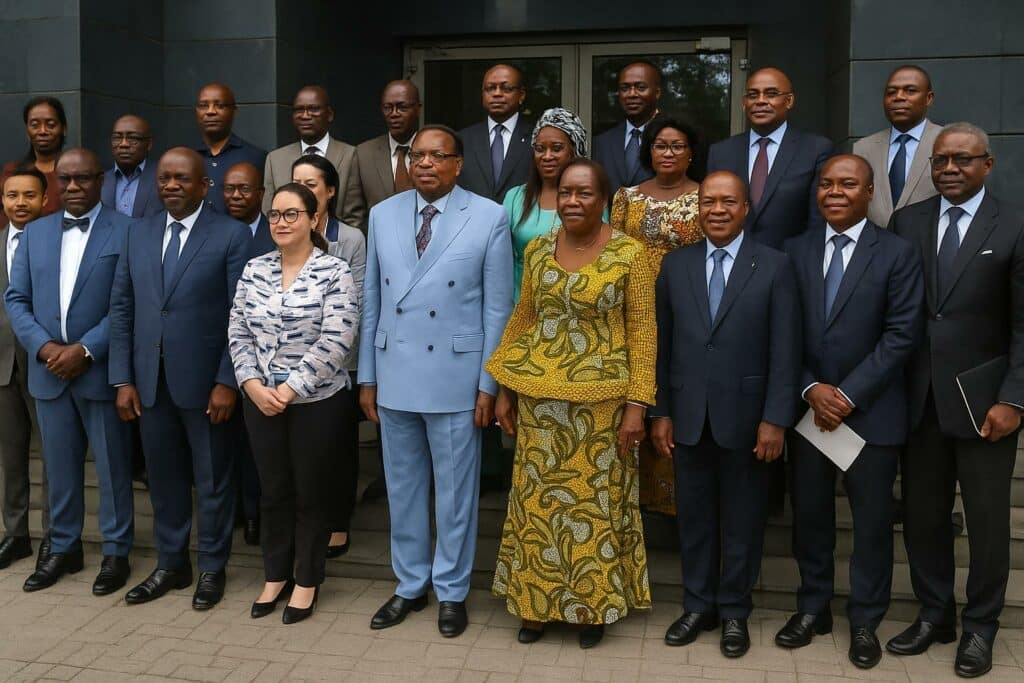Historic validation meeting in Brazzaville
Under the ornate ceiling of the Ministry of Urban Sanitation, Local Development and Road Maintenance, Minister Juste Désiré Mondelé opened on 14 October 2025 an intensive workshop whose single item of business was the final validation of the Republic of Congo’s first National Sanitation Policy. Flanked by the Resident Representative of UNICEF, the country manager of the African Development Bank and the deputy-mayor of Brazzaville, Dieudonné Bantsimba, the minister framed the gathering as a turning-point: “This policy,” he observed, “is the compass by which we shall reach the Sustainable Development Goals while safeguarding the President’s vision of shared prosperity.”
After two days of technical scrutiny, line-by-line amendments and budgetary calibrations, the participants—officials, engineers, private operators and civil-society leaders—adopted the 80-page document by consensus, a vote greeted with sustained applause.
Government champions sanitation overhaul
Speaking for the municipal executives of the capital, Mr Bantsimba reminded the hall that inadequate waste management remains one of the principal vectors of water-borne disease in both urban arrondissements and remote villages. An integrated sanitation system, he argued, therefore constitutes “not a luxury but a public-health imperative, an environmental shield and a quality-of-life dividend for every Congolese household.”
Minister Mondelé elaborated on four strategic pillars now enshrined in national planning: reduction of pathologies linked to unclean environments; environmental protection in the face of climate shocks; stimulation of the circular economy through waste-to-resource initiatives; and strengthened governance mechanisms ensuring that local authorities, the private sector and development partners pull in the same direction. He insisted that the Government will mobilise domestic resources while leveraging concessional finance to translate the blueprint into latrines, sewerage networks and recycling centres that work.
Stakeholders rally around UNICEF vision
For UNICEF, the stakes are equally human and developmental. The agency’s representative pointed out that effective sanitation can lower incidences of diarrhoeal disease, improve nutritional outcomes and keep girls in school by providing safe facilities: “Assainissement is a catalyst for social progress and a cornerstone of children’s rights.” The workshop’s multi-sectoral lens—health, education, gender—mirrored UNICEF’s call for a holistic approach, one that sees toilets and drainage not as stand-alone infrastructure but as interlocking components of child protection and community resilience.
AfDB delegates echoed that sentiment, noting that sanitation projects exhibit some of the highest economic multipliers in infrastructure portfolios, generating skilled employment while preserving ecosystems. Their presence signalled continued willingness to fund feasibility studies, capacity-building and eventually bricks-and-mortar interventions, provided that transparency and measurable impact remain front and centre.
À retenir : health, jobs and climate resilience
Three takeaways dominated corridor conversations. First, the policy links disease prevention explicitly to environmental stewardship, an alignment that should ease coordination between the Ministries of Health and Environment. Second, it embeds the circular-economy principle, encouraging entrepreneurs to view waste as feedstock for fertiliser or energy, and thus as a source of green jobs. Third, it mandates inclusive service delivery so that rural districts no longer languish behind coastal cities, a provision applauded by deputies from Sangha and Likouala.
Le point juridique/éco : a new regulatory canvas
Legal experts attending the workshop highlighted forthcoming decrees that will clarify standards for pit latrines, effluent discharge and private-sector concessions. By defining service levels and tariff structures, the Government seeks to de-risk investment while shielding low-income households from sudden price hikes. Economists, meanwhile, underscored that the policy’s emphasis on maintenance—often the Achilles heel of infrastructure—could lengthen asset lifecycles and reduce fiscal pressure over time.
Next steps after Brazzaville workshop
With the policy now validated, an inter-ministerial committee will draft an implementation plan, complete with earmarked budgets, performance indicators and an annual review mechanism. Municipalities are expected to submit project pipelines within six months, while the Ministry negotiates financing envelopes with partners. On the communication front, a nationwide awareness campaign will aim to shift social norms around hand-washing, waste disposal and the payment of modest service fees.
Closing the workshop, Minister Mondelé reiterated the administration’s pledge to deliver concrete improvements: “We shall not rest until every Congolese child can play, learn and grow in a clean, safe environment.” His words captured both the urgency and the optimism that characterised a meeting many participants now describe as seminal for the Republic of Congo’s sustainable development trajectory.

